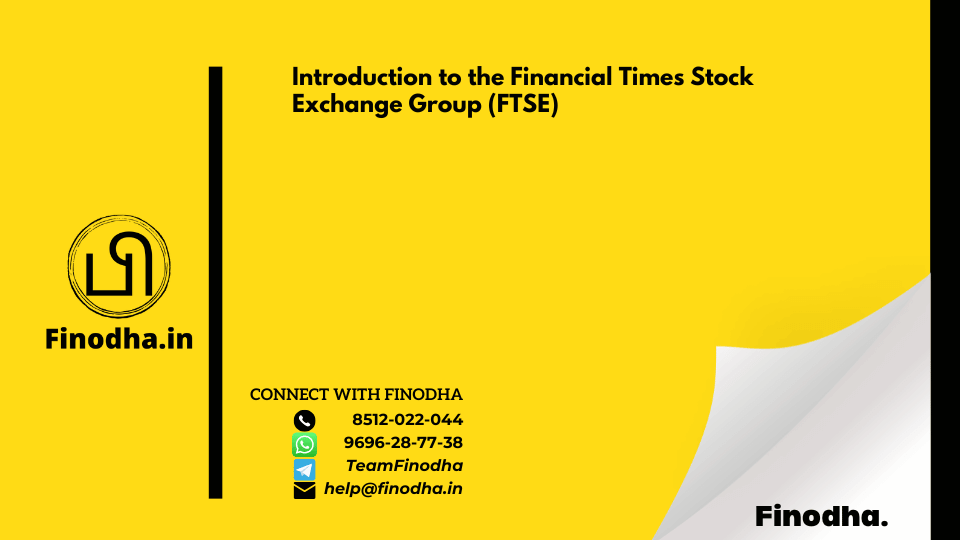Important Keyword: Financial Times Stock Exchange, Financial Indices, Investment Benchmarks, UK Stock Market.
Table of Contents

Overview of Financial Times Stock Exchange Russell Group
The FTSE Russell Group is a prominent organization within the financial landscape, stemming from the merger of two well-established entities: the Financial Times Stock Exchange (FTSE) and Russell Investments. This amalgamation was formalized in 2015, marking a pivotal moment in the enrichment of global financial indices. The FTSE has roots dating back to 1935, originally introduced to provide a mechanism for tracking the performance of the London Stock Exchange, while Russell Investments has been serving investors since 1936 with a focus on index and investment management solutions. Together, these legacies present a robust foundation for the FTSE Russell Group.
The primary mission of the FTSE Russell Group is to empower investors by offering comprehensive index solutions that span various asset classes and geographies. Through their innovative approach, they seek to enhance transparency and efficiency in the financial markets. The organization is responsible for compiling a multitude of indices, which are used globally as benchmarks for investment products, as well as strategic tools for asset allocation. The range includes well-known indices, such as the FTSE 100, which represents the largest companies on the London Stock Exchange, and the Russell 2000 index, which captures the performance of small-cap US stocks.
History and Evolution of Financial Times Stock Exchange
The Financial Times Stock Exchange Group, commonly known as FTSE, originated in 1984 as a result of a collaboration between the Financial Times and the London Stock Exchange. The intent was to create a new stock market index that would reflect the performance of UK equities. Initially, the FTSE 100 index was introduced, comprising the top 100 companies listed on the London Stock Exchange, making it a significant benchmark for measuring the health of the UK economy and the performance of top-tier corporations.
Over the years, FTSE has evolved considerably. In 1995, the parent company, FTSE International Limited, was formed, marking a crucial step in ensuring that the index remained a reputable source of investment performance metrics. The governance structure also evolved, with FTSE adopting a more independent approach by establishing the FTSE Advisory Committee. This included financial and investment professionals tasked with ensuring that the index’s methodology and composition accurately reflected market movements and trends.
Several economic events have significantly impacted the FTSE over the years. For instance, the dot-com bubble burst in the early 2000s led to significant fluctuations within the index, while the global financial crisis of 2007-2008 prompted discussions around its resilience and modifications in its calculation methodology. The aftermath of such economic shifts necessitated a more rigorous framework for index governance. Consequently, the FTSE became a part of the FTSE Russell group in 2015, owned by the London Stock Exchange, which enhanced its resources and expanded its global presence. This evolution has further solidified FTSE’s position as a key player in the financial industry, catering not only to the UK market but also to global investors seeking reliable stock market indices.
The Role of London Stock Exchange Group (LSEG)
The London Stock Exchange Group (LSEG) plays a pivotal role in the management and oversight of the FTSE Russell Group, which comprises various indices including the well-known Financial Times Stock Exchange 100. As a leading global financial markets infrastructure provider, LSEG ensures that the Financial Times Stock Exchange indices reflect the underlying market conditions while promoting transparency and efficiency in the trading of securities. The effective functioning of the stock exchange depends on LSEG’s commitment to high standards of governance, integrity, and innovation.
In addition to managing the Financial Times Stock Exchange indices, LSEG oversees various other assets, including a broad range of market services and products. These include fixed income trading, derivatives markets, and the capital markets segment, which caters to a diverse clientele ranging from institutional investors to individual traders. The group also holds ownership of leading data analytics and trading platforms, enhancing its ability to deliver comprehensive financial solutions. This diversified portfolio maximizes the group’s market presence and solidifies its reputation as a trusted entity within the financial ecosystem.
The synergy between the different financial brands under LSEG’s management creates a cohesive structure that benefits stakeholders across the board. By leveraging advanced technology and data analytics, LSEG enhances market operations, enabling better price discovery and risk management for investors. Furthermore, the integration of various financial services fosters a more efficient trading environment that aligns with the global demand for faster and more reliable transactions. Overall, LSEG’s strategic oversight of the Financial Times Stock Exchange Russell Group is integral to the robust functioning of financial markets and supports a higher level of investor confidence.
Index Offerings and Their Importance
FTSE Russell plays a central role in the investment landscape through its extensive portfolio of index offerings. These indices serve as critical benchmarks for various asset classes, providing investors and funds with a transparent methodology to assess performance and manage risk. Among the most well-known offerings are the Financial Times Stock Exchange 100 and FTSE 250 indices, which focus on large and medium-sized companies in the UK. These indices are essential for portfolio managers who seek to gauge the performance of the UK equity market.
The construction of Financial Times Stock Exchange indices is rooted in a rigorous methodology designed to ensure fairness and precision. Financial Times Stock Exchange Russell employs a rules-based approach, which includes criteria such as market capitalization, liquidity, and geographical presence. This structured methodology not only enhances transparency but also instills investor confidence, making it a reliable source for tracking market trends. Furthermore, these indices are regularly reviewed and adjusted to reflect shifts in market dynamics.
Beyond the UK-centric indices, Financial Times Stock Exchange Russell offers a variety of global indices encompassing emerging markets, sustainable investing, and thematic indices. These offerings facilitate diversified investment strategies and allow investors to target specific sectors or trends, enhancing their portfolio’s performance potential. Through these various products, FTSE Russell addresses the diverse needs of the investment community, empowering them with tools to make informed decisions.
Moreover, the importance of FTSE indices extends beyond mere benchmarks; they also serve as the basis for numerous financial products, including Exchange-Traded Funds (ETFs) and derivatives. Such financial instruments provide liquidity and flexibility to investors, enabling them to gain exposure to a wide array of asset classes efficiently. In an increasingly complex financial landscape, these index offerings are indispensable, providing essential insights into market performance and investment opportunities.
FTSE Indices in the Global Market
The Financial Times Stock Exchange Group (FTSE) indices play a pivotal role in the landscape of global finance. As benchmarks for equity performance, they are widely accepted and utilized by a myriad of international investors. The Financial Times Stock Exchange indices, which encompass various market segments, provide a comprehensive overview of the performance of stocks listed on the London Stock Exchange and beyond. This broad reach offers investors insights into the economic health and market trends of different sectors, facilitating informed decision-making.
Financial Times Stock Exchange indices serve as essential tools for asset managers and portfolio managers globally. By providing standardized metrics, these indices allow for effective comparison against market performance, helping professionals gauge the success of their investment strategies. For instance, the Financial Times Stock Exchange 100 Index, which comprises the 100 largest companies listed on the London Stock Exchange, is often referenced by fund managers to measure the performance of investment portfolios that are heavily exposed to UK equities. Moreover, the FTSE All-Share Index includes a larger scope of companies, capturing approximately 98% of the entire UK stock market, further aiding in thorough market analysis.
The significance of Financial Times Stock Exchange indices extends beyond the borders of the United Kingdom. Many international funds and investment vehicles utilize Financial Times Stock Exchange indices as benchmarks due to their robustness and credibility. This global acceptance underscores the importance of Financial Times Stock Exchange indices in portfolio construction and risk management strategies worldwide. Additionally, the inclusion of Financial Times Stock Exchange indices in various exchange-traded funds (ETFs) and derivatives highlights their integrative role in the global investment ecosystem, making them indispensable for both institutional and retail investors alike.
Investment Strategies Involving FTSE Indices
The Financial Times Stock Exchange Group (FTSE) indices serve as essential benchmarks for a variety of investment strategies. Investors often use these indices to gauge market performance and tailor their portfolios accordingly. Two primary approaches employed in relation to Financial Times Stock Exchange indices are passive management and active management, each serving distinct objectives and offering unique benefits.
Passive management involves investing in index-tracking funds, which aim to replicate the performance of a specific FTSE index. This strategy offers investors a cost-effective method of gaining exposure to a diversified array of securities. By tracking an index, investors can benefit from the overall market’s growth while avoiding the costs and risks associated with selecting individual stocks. Funds that track indices such as the Financial Times Stock Exchange 100 or Financial Times Stock Exchange All-Share allow investors to capitalize on market movements without needing to engage in extensive portfolio management.
Conversely, active management requires a more hands-on approach where portfolio managers make individual stock selections to outperform the FTSE indices. This approach involves rigorous research and analysis, focusing on identifying undervalued assets or sectors within the indices. Active managers may use strategies such as sector rotation, allowing them to adapt to changing market conditions while aiming for superior returns. However, this strategy often incurs higher fees and requires more resources, which can affect overall returns.
Investors must consider their risk tolerance, investment goals, and market outlook when choosing between passive and active management strategies associated with FTSE indices. Additionally, blending both strategies can offer a balanced approach that capitalizes on the benefits of diversification while also positioning for potentially higher returns. Utilizing Financial Times Stock Exchange indices provides a framework through which investors can navigate the complexities of the stock market effectively.
Technological Innovations at Financial Times Stock Exchange
The Financial Times Stock Exchange Group (FTSE) has continually embraced technological advancements to improve its operations, particularly through the integration of data analytics, algorithmic trading, and the overall digitization of financial indices. These innovations play a critical role in enhancing the accuracy and efficiency of financial markets, which are constantly evolving in response to investor demands and global economic conditions.
Data analytics is one of the cornerstones of FTSE’s operations. With the vast amount of financial data generated daily, the ability to process and analyze this information swiftly is essential. By leveraging advanced analytics tools, FTSE can identify trends and patterns that inform investment strategies, risk assessments, and market forecasting. This data-driven approach not only enhances decision-making processes but also allows market participants to access more precise information, ultimately aiding in investment performance and compliance requirements.
Algorithmic trading represents another significant technological advancement employed by the FTSE. This method utilizes algorithms to execute trades at speeds and frequencies that surpass human capabilities. The implementation of algorithmic trading has transformed the landscape of stock exchanges, enabling investors to react to market changes in real-time. The FTSE Russell Group has thus facilitated tighter spreads and improved liquidity in the market, providing investors with opportunities to optimize their trading strategies.
Moreover, the digitization of financial indices has reshaped how investors interact with market data. By transitioning to digital platforms, FTSE offers real-time access to crucial information, improving transparency and enabling better-informed investment decisions. This shift to digital solutions not only aligns with the evolving expectations of investors but also positions FTSE as a leader in providing comprehensive market insights.
In conclusion, technological innovations such as data analytics, algorithmic trading, and digitization have significantly enhanced the efficiency and accuracy of the FTSE Russell Group’s operations, leading to a more robust financial market environment.
Challenges and Critiques Facing FTSE
The Financial Times Stock Exchange Group (FTSE) has established itself as a prominent entity in the financial services sector, providing investors with a range of indices that are critical for gauging market performance. However, it faces numerous challenges that include increased market competition, regulatory scrutiny, and critiques regarding its index methodologies. Understanding these challenges is essential for recognizing the FTSE’s position and strategies in the global financial landscape.
One significant challenge is the heightened competition in the index provider market. Competitors, including MSCI and S&P Dow Jones Indices, have increasingly introduced products that cater to diverse investment needs. This proliferation of alternative indices may lead to market fragmentation and compel the FTSE to innovate and differentiate its offerings further. For instance, the growing demand for ESG (Environmental, Social, and Governance) indices requires FTSE to augment its approach to ensure alignment with sustainability trends without compromising on accuracy.
Regulatory issues are another area of concern. The financial sector is subject to stringent regulations that can affect index calculations and methodologies. Compliance with new directives, such as MiFID II and EMIR in Europe, necessitates that FTSE continuously adapt its operations to meet evolving legislative requirements. This adaptation could involve adopting more transparent governance practices, thereby bolstering investor confidence in FTSE indices.
Moreover, the FTSE has faced critiques related to its index methodologies, especially concerning the criteria for inclusion in certain indices. Critics argue that certain indices do not accurately reflect underlying market conditions or adequately represent the asset class they intend to track. To address this issue, the FTSE may benefit from engaging in a more extensive review of its methodology, soliciting feedback from market participants, and potentially revising its frameworks to align better with stakeholder expectations.
The Future of FTSE Russell Group
The FTSE Russell Group stands at a critical junction, poised to navigate an ever-evolving landscape characterized by emerging trends in financial markets, shifts in investor behaviors, and advances in technology. As the demand for diversified investment products grows, it is likely that FTSE Russell will adapt by expanding its index offerings and creating innovative financial products that cater to these changing market dynamics. The rising trend of environmental, social, and governance (ESG) investing illustrates one such shift that is already influencing financial markets. FTSE Russell has already begun to introduce ESG-focused indices, and it is plausible that they will continue this trajectory, enhancing their array of sustainable investment products.
Investor behavior is also changing, with an increasing preference for personalized investment solutions and data-driven decision-making. FTSE Russell is well-positioned to respond to this trend by leveraging big data and analytics to offer customizable indices that meet specific investor needs. This strategic direction could lead to the launch of bespoke indices that provide unique exposures, allowing investors to navigate complex market environments more effectively.
Additionally, technological advancements, particularly in the realm of digital finance and fintech, present both opportunities and challenges for the FTSE Russell Group. The integration of artificial intelligence (AI) and machine learning within financial data analysis could revolutionize how indices are constructed and maintained. Such technological innovations may encourage FTSE Russell to explore new products, such as algorithmically managed portfolios linked to their indices, ensuring that their offerings remain competitive.
Incorporating these trends into their strategic vision will be crucial for FTSE Russell’s future. Ultimately, these adaptations will not only enhance their offerings but also solidify their position as a leader in the global financial market, ensuring that they remain relevant amidst a continuously shifting financial landscape.
Download Pdf: https://taxinformation.cbic.gov.in/




